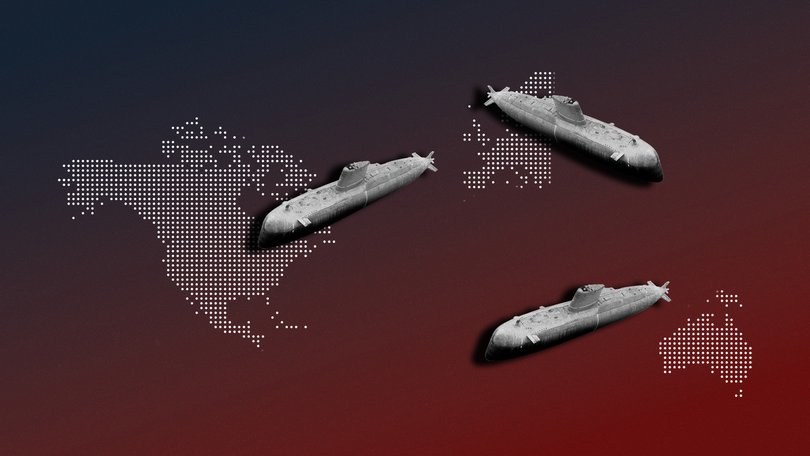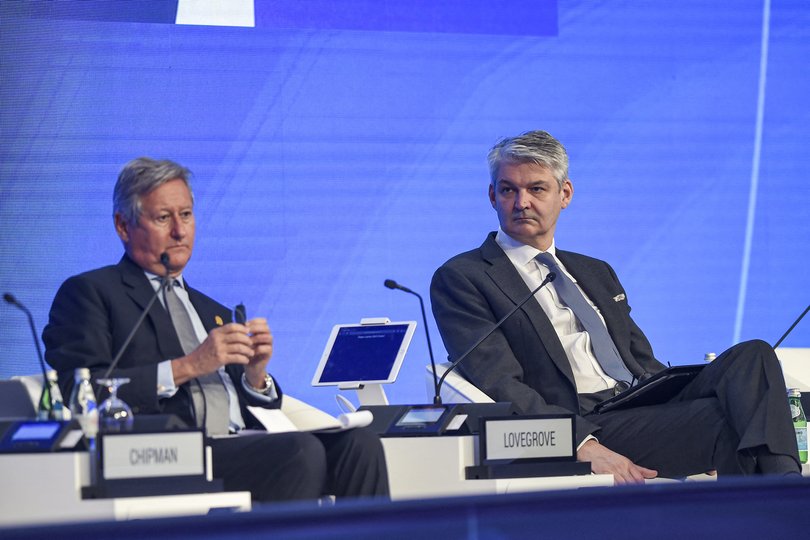Top British defence official, Stephen Lovegrove, allays AUKUS fears
The UK’s special envoy for AUKUS has played down fears about the Pentagon’s review of the trilateral nuclear-powered submarine program.

The UK’s special envoy for AUKUS has played down fears about the Pentagon’s review of the trilateral nuclear-powered program but warned that Australia may have to speed up the submarine-building process.
Former British national security adviser Sir Stephen Lovegrove also stressed to senior defence officials in Canberra the UK was more committed than ever to the project.
Mr Lovegrove this week is travelling between the capital and Perth to brief the Government and top officials on the outcome of a British review of the defence partnership forged in 2021 between Australia, the UK and the United States in response to shared concerns about China’s growing military footprint.
Sign up to The Nightly's newsletters.
Get the first look at the digital newspaper, curated daily stories and breaking headlines delivered to your inbox.
By continuing you agree to our Terms and Privacy Policy.His sanguine assessment of Washington’s approach to AUKUS comes ahead of the imminent conclusion of a Pentagon review, which has stoked Australian anxiety about whether Washington could either withdraw or place more onerous demands on Canberra over defence spending.
“I’m not worried about the review,” Mr Lovegrove told the ABC’s 7.30 show on Wednesday, comparing it to his own assessment for the British government.
“It is entirely right and appropriate for new governments to look at programs of this size, of this scale. AUKUS is one of those programs that brings enormous value to each of its partners. It certainly brings a great deal of value to the US,” he said.
The security partnership aims to deliver a nuclear-powered submarine capability for Australia with the help of the US and the UK, as well as boosting trilateral defence cooperation on cyber and artificial intelligence and other cutting-edge technologies.
The first stage of so-called “Pillar 1” would see British and American nuclear submarines rotating through Perth from 2027 before the sale of US Navy Virginia-class attack submarines to Australia in the early 2030s.
In the latter stage, Australia will construct a new SSN-Aukus fleet in Adelaide with the help of the UK and using US technology, alongside the development of advanced weapons such as hypersonic missiles.
The program’s “Pillar 2” is focused on creating a new defence ecosystem between the three countries.
Mr Lovegrove was commissioned last year to review Britain’s progress to meeting AUKUS deadlines and make recommendations on how to streamline procedures.
The findings have not been made public but redacted versions have been sent to Canberra and Washington, which he also visited in May for talks with US officials.
He told a conference hosted by the Australian Strategic Policy Institute on Wednesday the UK Government viewed AUKUS as a “momentous collaboration” between three allies that reflected the strategic link between the security of the Indo-Pacific and the Euro-Atlantic.
But his largely positive assessment of progress and the strategy underpinning the partnership comes as Canberra nervously awaits the outcome of a Pentagon evaluation led by policy chief Elbridge Colby, who has expressed both support and scepticism about the ambitious pact.
A report in the Sydney Morning Herald on Thursday, citing unnamed sources familiar with the review and who had spoken with Mr Colby, said Australia may be asked to pay more for submarines under the $368 billion agreement.
It said Mr Colby may also demand major changes such as public declaration or private guarantee from Australia that US-made nuclear submarines would be used in a possible conflict with China.
Such a demand would be politically sensitive for Prime Minister Anthony Albanese as he embarks on a six-day visit to China from Saturday where Australian defence spending and AUKUS are likely to be raised in talks with Chinese leaders, including President Xi Jinping.

Ahead of his trip, Mr Albanese made a keynote speech marking the 80th anniversary of the death of Labor’s wartime prime minister John Curtin, where he stressed that while the US was Australia’s most important security partnership, the Government would follow its own path in foreign policy.
That message was underscored in a further address by Foreign Minister Penny Wong at the Institute for Strategic and International Studies in Malaysia on Thursday, who said that Australia’s security could not be simply defined by American or Chinese actions in the region.
The Foreign Minister added that AUKUS represented a transparent contribution to “collective deterrence.”
Despite Australian jitters over the Pentagon report, Mr Lovegrove told the ABC he expected it to produce a series of “very considered recommendations.”
He added that there was huge bilateral support for AUKUS, which was backed by the US Navy, State and Defence Departments.
“I’m pretty comfortable that we’ll end up with the right answer for the US, for Australia and the UK. This is a critical program,” he said.
Mr Lovegrove suggested the review may focus on ensuring the US had the maximum number of Virginia-class submarines in the water and on whether they were building the vessels fast enough.
“But one of the other crucial things they’re going to be looking at is the massive contribution that Australia is making by allowing Western Australia to be used as a maintenance and sustainment hub,” he said.
The senior official was set to visit the Henderson shipyard in Perth on Thursday and suggested the Government may need to “look carefully” at whether more investment was needed.
“As they say, schedule is king here. We need to be acting at the speed of relevance,” he said.
In his presentation to ASPI, Mr Lovegrove said the UK review had stressed the need for the speedy execution of pillars one and two, and confirmed the timetables were largely on track.
However, the report concluded that despite making headway on broader defence collaboration under pillar 2, that the three nations were “a little bit behind” due to the political turbulence of electoral cycles.
“I think the process of prioritisation has probably been less rigorous, perhaps, than it should have been,” he said, suggesting that creation of US and Australian AUKUS envoys as his direct counterparts would be “helpful” for the program’s progress.
The senior civil servant also underscored the need for more efforts to ensure public buy-in to the strategic importance and legitimacy of the AUKUS project.
“You don’t buy a Lamborghini in order to take the children to school. If you’re going to do something like this, you’ve got to explain why you’re making such a very big commitment,” he said.
Although there were loud critics in Australia questioning the expense of AUKUS, or whether it created a capability gap, there was also by and large an appreciation of the “perilous world” that we live in, he said.
“The range of different threats that we are all facing has given AUKUS a salience and a public acceptance that we need to build on.”’

